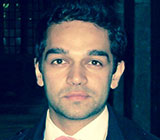 The first year of medical postgraduate training, known in the UK as foundation year one (or previously as the “pre-registration house officer” year), is a decisive time for junior doctors. Like most of my colleagues, I was inspired by lots of physicians and surgeons during this year and was regularly wowed by seemingly brilliant diagnoses and procedural skills. There was, however, one academic physician who I remember particularly fondly.
The first year of medical postgraduate training, known in the UK as foundation year one (or previously as the “pre-registration house officer” year), is a decisive time for junior doctors. Like most of my colleagues, I was inspired by lots of physicians and surgeons during this year and was regularly wowed by seemingly brilliant diagnoses and procedural skills. There was, however, one academic physician who I remember particularly fondly.
In the high pressured environment of a busy London teaching hospital, she always found time to talk to people and often stopped ward rounds to engage in lengthy conversations with patients and their families, taking an interest in social and psychological nuances that I would never have thought of exploring. As well as her kindness to patients and family members, she also took a deep interest in her junior colleagues, regularly stopping for coffee breaks to listen to concerns and share advice. There was one particular piece of advice she gave me during one of these coffee breaks that has stayed with me ever since, and which particularly resonates since I’ve come to the end of my medical training.
Reflecting on the fact that she had ended up training in a specialty different to the one she had initially wanted to pursue, she felt that doctors dwell far too much on these early career choices. No matter which specialty you train in, she told us, you’ll find your own niche in it. At the time, choosing the right specialty seemed the most important decision in the world and I couldn’t honestly see what she meant. Years on, though, having come to the end of my own training journey, I realise that she was absolutely right.
At the time I was working for her, I was sure in my mind that I wanted to train in cardiology and couldn’t see how my interests could ever be met without entering the specialty. As it turned out though, I enrolled on an MSc programme; discovered I was actually more interested in epidemiology, risk, and patient experiences of heart disease; and ended up completing an academic clinical fellowship in general practice. Although I would never have believed it back then, I’ve found a career path that has allowed me to further these interests while practising a stimulating clinical discipline that I’ve grown to love.
Having taken up an academic training fellowship, I further extended my training by spending a year on the National Medical Director’s clinical fellow scheme, which involved a 12 month placement at the National Institute for Health and Care Excellence. When I reflect back on my training, I’ve had the chance to work with distinguished cardiovascular researchers, deliver seminars and lectures about cardiovascular risk to medical students and GP colleagues, and develop guidelines and implementation products about cardiovascular diseases at a national level.
More importantly than that though, I’ve met countless doctors working outside their specialty cliché boxes. From orthopaedic surgeons obsessed with medical statistics and health economics to oncologists working as hospital chief executives, the medical world is full of individuals who use their skills to cross boundaries and buck trends.
So as we come to that time of year when medical students make the terrifying leap to junior doctor and social media pages fill up with #tipsfornewdocs, I would urge the new generation of doctors to avoid losing sleep over their career choices. Rather, I hope that they will work hard, play hard, grab any interesting opportunities that come their way, and, most importantly, enjoy the ride. Every medical training journey is unique and no matter what path one takes, there’ll undoubtedly be opportunities to develop new skills and have a varied and interesting career.
Ahmed Rashid is a newly qualified NHS general practitioner, based in Cambridge. You can follow him on Twitter: @Dr_A_Rashid
Competing interests: None.
